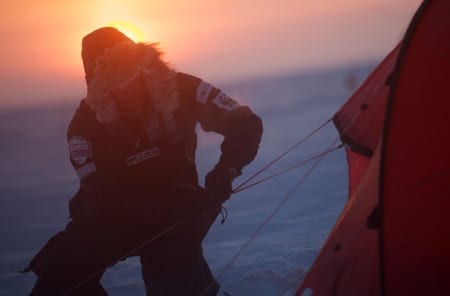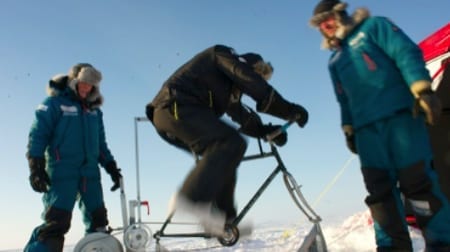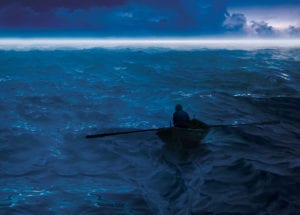By Daniel de la Calle
A few years from now I will inevitably become an insufferable cranky old man. I am actually almost there now: On World Water Day last week I turned my forgotten TV set on, the one that comes back to life during cycling season, and watched the 3 p.m. news. I wanted to see if Spanish National Television (TVE) would mention the event, hear what they would say. They obviously did, how could they not! It is news, the fuel that keeps the media engine running, 45 more seconds of blah blah babble with an assortment of beautiful water images from around the globe and shots of pollution, droughts, dead fish and birds that were seamlessly followed by the handsome newsman announcing that on Saturday the 26th, during Earth Hour Televisión Española would show its solidarity and commitment, which is our commitment as the human race, by turning the lights off the big “TVE” sign atop the Madrid studios FOR A WHOLE HOUR. That is 60 full minutes, or 3600 precious seconds. Impressive. It is wonderful, ecological and smart, I am quite certain there was nothing happening on March 26th, so now we have one more day to turn lights on, or shut them down, or make stickers, or t-shirts, and deliver content for radio shows, news broadcasts, to create a Facebook group, have elevator talk ammunition and be proud we are saving the planet with the 50 kilowatts saved during that whole round hour. My problems are two, though: 1, it gets me so riled up that I am not sure I will even turn the TV back on until the Giro de Italia (May); and 2, thanks our perfected ability to trivialize serious matters I feel one step closer to being a nasty old man with cranky wrinkles on the face.
And now for something completely different:
(or the usual short list of news from the World Wide Web)
¤Every once in a while scientific research takes place in the form of
true exploratory adventure, as has been the case for the past three years with the
Catling Arctic Survey.

A small team of thoroughly covered up women and men is doing crucial ocean research in the inhospitable Arctic wilderness around Resolute Bay. On one of the latest blog entries these brave scientists talk about zoo-plankton sampling and a
smart bicycle winch they have invented to assist in the task. I am a sucker for anything with
pedals and a chain, so this just had to make it into the blog.

But their website also offers valuable information, good pictures and great
videos. HERE is a link to one on Ocean Acidification, arguably the
coolest (as in “coldest”) I have ever posted.
¤The American Fisheries Society (AFS), the world’s largest association of fisheries professionals and scientists, will hold this year’s annual meeting in Seattle. The theme is “New Frontiers in Fisheries Management and Ecology: Leading the Way in a Changing World.” They plan to cover many topics over the 30 concurrent sessions and will have special symposia on the global fisheries crisis, the effects of oil spills on fisheries, fisheries and hard-rock mining, climate change and the future of Pacific salmon and Ocean Acidification, to name some.
As stated on their website, the “conference will also feature a popular slate of technical training sessions, workshops, and field trips. Members of the public, non-governmental organizations, and non-fisheries professionals who are interested in fisheries science and management, marine and freshwater habitat protection, or fisheries-related recreation are welcome to attend the meeting. The meeting venue in downtown Seattle is within walking distance of Seattle’s vibrant waterfront and world famous Pike Place Farmers Market. There you go, if you are in Seattle you are invited to attend. Go here http://afs2011.org/ for more info.
¤Music band Modest Mouse titled one of their albums “Good News for People Who Love Bad News”.
Good news is so tricky, some have the power make you sad and hopeless: a team of Australian researchers is planning to develop a bank of stored frozen coral polyps from the Great Barrier Reef so they can survive extinction. Thanks to liquid nitrogen at -296 degrees Fahrenheit organic matter can last forever: it cannot break down. THIS is where I read about it.
¤Continuing on the other side of the world the University of Guam is hosting a Regional Conference on Island Sustainability for Guam and Micronesia
on April 19th and 20th this year. The theme is “Guam 2050 – Developing
our Sustainable Future: What is the Cost of Doing Nothing?”. The
conference will touch topics such as sustainable energy management,
technological innovations, policy implementation, sustainable
environments and their conservation, with a focus on sea level rise,
climate change and Ocean Acidification.
¤This past January the National Council for Science and the Environment organized the 11th National Conference on Science, Policy and the Environment
in Washington DC. These are three videos they put up on Youtube with lectures and a debate on Ocean Acidification:
Part 1
Part 2
Part 3


